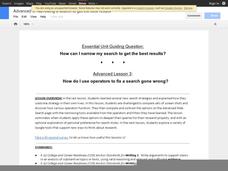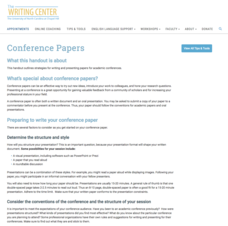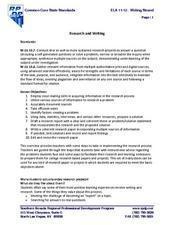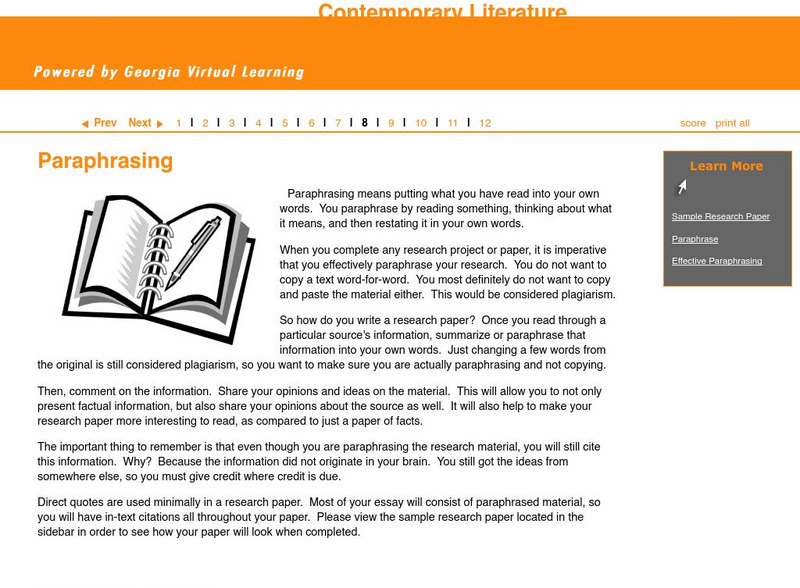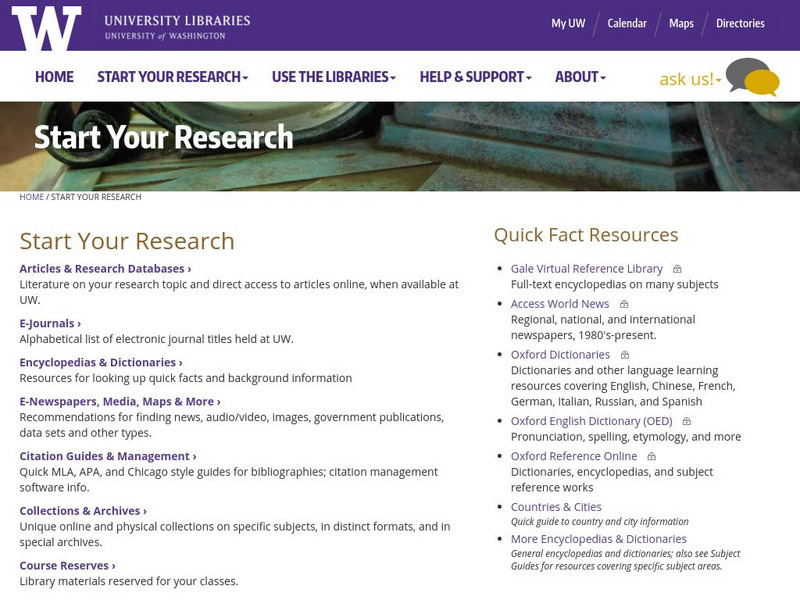Google
Advanced 3: Narrowing a Search to Get the Best Results
Familiarize your class with Google operators, specific symbols, or words they can use to express more clearly to the search tool what they want to find. With the resources included here, they can test their previous knowledge, view...
Curated OER
Patti Smith: Dream of Life
How do artists affect and how are artists affected by the time periods in which they live? Learners examine the life and work of controversial and influential cultural artist Patti Smith as they seek answers to this essential question....
Curated OER
Interpreting Foundation Documents of the American Republic
Explore early American documents that qualify as primary sources. Tenth and eleventh graders use the provided worksheets to analyze the texts of the Articles of Association, the Declaration of Independence, the Articles of Confederation,...
University of North Carolina
Conference Papers
In the world of academia, conference papers and presentations play a big role. It's through conference papers that professors and graduate assistants share their research with others in the field. A handout on conference papers, part of...
Student Handouts
Graphic Organizer: Reference Citations
Pupils practice researching sources and logging citation information with this graphic organizer. After posing a general topic, groups of students are asked to devise general questions about that topic, and to research sources...
Southern Nevada Regional Professional Development Program
Researching and Writing
Designed for teachers, this resource identifies problems learners face when attempting a research project and approaches instructors can use to help their class members overcome these obstacles. Suggestions are included for how to help...
National Endowment for the Humanities
Thirteen Ways of Reading a Modernist Poem
High schoolers analyze modernist poetry and the role of speaker in example poems. Learners study modernist poems from the Romanticism and Victorian periods as well as Wallace Stevens' "Thirteen Ways of Looking at a Blackbird." Using a...
University of Glasgow
University of Glasgow: Critical Reviews
This site is designed to be used by psychology students at the university level, but it provides helpful instruction for anyone writing critical reviews of non-fiction. Instruction includes everything from how to be critical to...
Other
The New Guide to Writing
This site contains several helpful suggestions for writing a research paper including a schedule which breaks down the process into several smaller parts. Students can set reasonable deadlines for themselves. Also, this site outlines one...
Other
Monash University Library: Evaluating Web Pages
Use this guide to learn how to evaluate web pages. This concise guide also addresses why evaluation is important. CCSS.ELA-Literacy.CCRA.R.7
Georgia Department of Education
Ga Virtual Learning: 10th Lit/comp
Contains learning modules on the following topics: Research and MLA Foundations, Novels and Short Stories, Poetry: the Sonnet, Shakespearean Drama, Informative and Argumentative Essays,Research and MLA Review, Narrative Nonfiction,...
Georgia Department of Education
Ga Virtual Learning: Technology and the World Around Us: Paraphrasing
This lesson focuses on the importance of paraphasing and how to paraphrase to avoid plagiarism. It provides links to an example of an MLA research paper, an article of effective paraphrasing, and a "Purdue Owl: Paraphrase" entry showing...
Sophia Learning
Sophia: Research Sources: Websites
This slideshow lesson focuses on the use of websites for research sources. It gives the pros and cons to using websites as sources and discusses the need to evaluate websites and what to look for.
Sophia Learning
Sophia: Evaluating Digital Information: Tutorial
In this slideshow tutorial, students will review how to evaluate digital sources. During the digital evaluation process, students are directed to analyze the following: authority, accuracy, objectivity, and currency. After the tutorial,...
Sophia Learning
Sophia: Mla Bibliographies
This tutorial focuses on MLA style bibliographies; it offers a video lesson defining bibliography, explaining the difference between bibliography and works cited, giving general format information, listing what is included, and providing...
Sophia Learning
Sophia: Research Sources
This slideshow lesson focuses on research sources by listing 10 types of sources: books, periodicals/magazines, newspaper articles, scholarly articles, databases, reviews, interviews, lectures, media (film, television), and websites. It...
Other
University of Washington Libraries: Starting Research
If you need help knowing where to start your research, or if you're a teacher looking for a way to help students understand the research process, this resource is terrific. Interactive tutorials on a number of topics offer review quizzes...
Virtual Salt
Virtual Salt: Evaluating Internet Research Resources
This site by Virtual Salt offers a great deal of information on evaluating internet sources. Gives tips on what to look for when screening information for usefulness and reliability.
Annenberg Foundation
Annenberg Learner: Interactives: Historical and Cultural Contexts
This interesting interactive website explains kinds of primary sources and gives you the chance to identify them in some games.
University of North Carolina
University of North Carolina: Writing Center: Handouts: Evidence
What kinds of evidence best support the points you make in a paper? Where can you find the evidence you need? This handout answers all these questions and more, including the difference between primary and secondary sources. You'll also...
Online Writing Lab at Purdue University
Purdue University Owl: Avoiding Plagiarism
Plagiarism is a serious offense in many educational settings. Plagiarism and copyright laws are reviewed here. Activities to avoid plagiarism are also provided through links. W.9-10.8 Sources, W.11-12.8 Sources/Integrate/Cite;...
Online Writing Lab at Purdue University
Purdue University Owl: Using American Psychological Association (Apa) Format
Extensive information on how to use the American Psychological Association (APA) format for citations. Information is provided on general format, referring to other works, reference list, notes, and examples in the APA format. W.9-10.8...
Online Writing Lab at Purdue University
Purdue University Owl: Mla Formatting and Style Guide
Extensive examination of the Modern Language Association (MLA) format of writing papers, making reference to the works of others, citations, and notes. W.9-10.8 Sources, L.9-10.3a Standard Format; CCSS.ELA-Literacy.WHST.6-8.8 Gather...
Other
Babson College: Evaluating Quality on the Net
Internet research is a fine writing tool, but can you trust the information you find? This presentation by Hope N. Tillman, Director of Libraries at Babson College, gives advice on assessing the quality and credibility of information...


